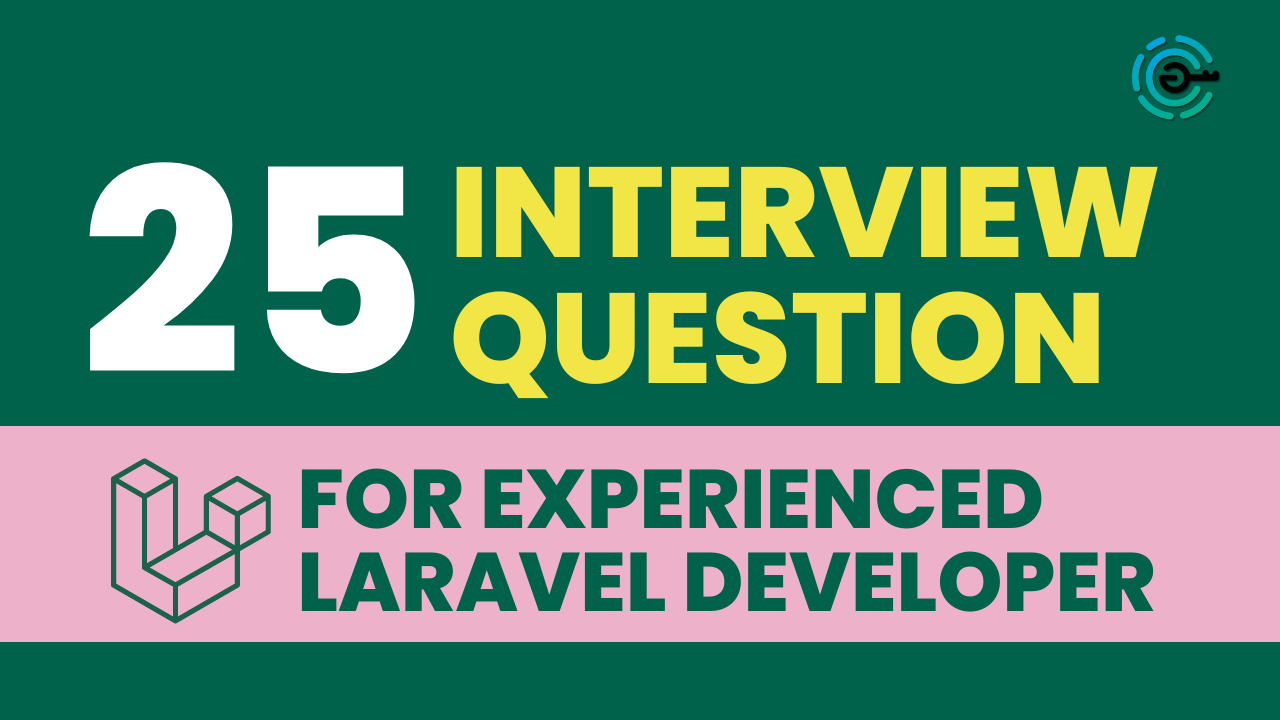Most asked 25 Interview Questions for Laravel Developer
 Kaushik Thakkar
Kaushik Thakkar
To become a Laravel developer or have an upcoming interview for a Laravel developer position, it's crucial to be well-prepared. This article provides a compilation of 25 commonly asked interview questions for Laravel developers. By familiarizing yourself with these questions and their corresponding answers, you can strengthen your understanding of Laravel concepts and increase your chances of acing the interview. From topics like routing and migrations to authentication and testing, this comprehensive list covers essential areas that Laravel developers should be knowledgeable about.
Q1: What is Laravel's service container, and how does it work?
A1: Laravel's service container is a powerful mechanism for managing dependencies in PHP applications. It binds interfaces to concrete implementations and resolves dependencies automatically, making code decoupled and testable. It allows developers to swap out implementations without changing dependent code.
Q2: What is The Facade in Laravel?
A2: Laravel's facades provide a convenient way to access Laravel components using a static API, eliminating the need for object instantiation or dependency injection. Facades enhance code readability and maintainability by offering a clean syntax for common operations.
Q3: What is Laravel's event system?
A3: Laravel's event system implements the observer pattern in PHP, separating event triggering from handling. It consists of events, listeners, and dispatchers. Events represent application occurrences, listeners handle events, and dispatchers trigger and notify listeners.
Q4: What is Laravel's job system?
A4: Laravel's job system enables asynchronous processing in PHP, offloading lengthy tasks to background workers or queues. Jobs are dispatched and processed by various drivers like Redis, RabbitMQ, and Amazon SQS, with built-in tools for monitoring and retries.
Q5: What is Laravel's validation system?
A5: Laravel's validation system offers a flexible way to validate user input and enforce business rules. It uses a fluent syntax to define validation rules for input fields, with support for custom rules and error messages.
Q6: What is Laravel's pagination?
A6: Laravel's pagination simplifies query result pagination in PHP applications. It offers methods to define items per page, access current page information, and customize pagination views.
Q7: What is Laravel's localization?
A7: Laravel's localization simplifies translating user-facing strings and messages. It uses language files, supports pluralization, and offers fallbacks for missing translations.
Q8: What is Laravel's middleware?
A8: Laravel's middleware allows the addition of processing logic to HTTP requests and responses in PHP. Middleware can handle authentication, authorization, caching, and more, providing a flexible approach.
Q9: What is Laravel's broadcasting feature?
A9: Laravel's broadcasting feature facilitates real-time communication between clients and servers in PHP. It supports various drivers like Pusher, Redis, and Amazon SNS and offers authentication and authorization for controlling access to events.
Q10: What is Laravel's blade templating engine?
A10: Laravel's blade templating engine simplifies defining HTML templates and components in PHP. It offers an easy-to-read syntax for dynamic templates and supports template inheritance and composition.
Q11: What is Laravel's Eloquent ORM, and how does it work?
A11: Laravel's Eloquent ORM is a powerful way to interact with databases in PHP. It allows developers to define models and relationships between them, simplifying database queries with a user-friendly syntax. Eloquent supports features like eager loading and polymorphic relationships.
Q12: What is Laravel's migration system?
A12: Laravel's migration system is a flexible approach to managing database schema changes using code. Migration files define changes, such as creating, modifying, or deleting tables, columns, and indexes, and support features like rollback and data seeding.
Q13: What is Laravel's testing system?
A13: Laravel's testing system provides comprehensive tools for writing and running automated tests in PHP applications. It includes various testing helpers and assertions, support for fixtures, and the ability to mock dependencies.
Q14: What is Laravel's artisan command-line interface?
A14: Laravel's artisan CLI is a powerful tool for interacting with Laravel applications via the terminal. Artisan commands are classes that can be executed using php artisan and offer various functionalities, including code generation, migration management, and running tests.
Q15: What is Laravel's queue system?
A15: Laravel's queue system is a robust method for handling time-consuming tasks asynchronously in PHP. It supports multiple drivers (e.g., Redis, Beanstalkd) and can be used to create complex job workflows, with built-in monitoring and retry capabilities.
Q16: What is Laravel's event system?
A16: Laravel's event system is a straightforward way to implement event-driven programming in PHP. It uses a publish-subscribe pattern to transmit events and supports listeners and subscribers to handle event logic.
Q17: What is Laravel's file storage system?
A17: Laravel's file storage system simplifies file management across different sources and destinations, with support for various drivers like local disk, Amazon S3, and FTP. It includes features for file uploads, downloads, and manipulation.
Q18: What is Laravel's task scheduling system?
A18: Laravel's task scheduling system allows developers to automate recurring tasks in PHP applications. It offers a user-friendly syntax for defining tasks and schedules, with features like task output and automatic retries.
Q19: What is Laravel's notification system?
A19: Laravel's notification system enables sending messages and notifications through various channels (e.g., email, SMS). It supports on-demand notifications and custom templates, offering versatility in user communication.
Q20: What is Laravel's service container?
A20: Laravel's service container simplifies dependency management and object resolution in PHP applications. It uses bindings and aliases to handle interfaces and implementations, supporting dependency injection and inversion of control.
Q21: What is Laravel's middleware system?
A21: Laravel's middleware system offers a modular approach to adding filters and actions to HTTP requests and responses. It is highly customizable, with support for route-specific and global middleware.
Q22: What is Laravel's database migration system?
A22: Laravel's database migration system provides a version-controlled approach to managing database schema changes using code. Migration files define schema modifications, supporting rollback and data seeding.
Q23: What is Laravel's authentication system?
A23: Laravel's authentication system simplifies user authentication and authorization in PHP applications. It offers features like registration, login, password reset, roles, permissions, and social authentication.
Q24: What is Laravel's caching system?
A24: Laravel's caching system is a high-speed way to store and retrieve data in PHP applications, reducing the need for database queries. It supports multiple drivers (e.g., APCu, Redis, Memcached) and features like cache tags and cache events.
Q25: How to prepare for a Laravel interview?
A25: To prepare for a Laravel interview, focus on understanding Laravel's core concepts, practice coding exercises, review common interview questions, and consider real-world scenarios. Additionally, familiarize yourself with best practices and stay updated with the latest Laravel developments.
Laravel interview tips, Laravel technical interview questions, Laravel interview questions and answers
Read other article to prepare interview: Top 25 Interview Questions for Fresher PHP Developers
Subscribe to my newsletter
Read articles from Kaushik Thakkar directly inside your inbox. Subscribe to the newsletter, and don't miss out.
Written by

Kaushik Thakkar
Kaushik Thakkar
I’m Kaushik, enjoy learning and writing about my experience, Full stack developer from India. Experecened in Laravel, PHP, CodeIgniter, WordPress,JavaScript, jQuery, Bootstrap and REST API.